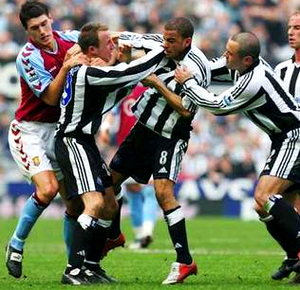We make assumptions all the time, don’t we?
Training will start 6.00pm;we assume that the coach is listening to our demands; we assume that all our teammates are in fact, our friends.
Assumptions are a necessity in everyday life but there are occasions when unchecked assumptions can compromise your soccer journey.
Here are 3 common situations where asking questions before you pull the proverbial trigger can maintain your sanity.
1. The coach has dropped you from the starting line up.
2. You feel such strong emotions towards a teammate that it clouds your better judgment.
3. The team is not producing the desired results.
In each situation it may appear helpful to react quickly based on the information at hand, don’t you think?
But doing so may result in adverse consequences.
Before you shoot your mouth or scratch that itchy trigger finger, lets break down each situation and assess what could happen if you don’t ask questions.
Dropped from the starting line up.
Is it the end of the world?
How should you proceed?
Chances are you know the reason/s why you’ve been dropped. Dropped is a harsh word so let’s say rested. Don’t let this upset you.
Instead of reacting, keep calm, smile and be proactive. Ask the coach for an explanation. Ask him for some advice and listen to his feedback. Also let him know that you support his decision.
Believe it or not, I’m not crazy. This will keep him on your side and will increase your chances of getting back in the starting line up. This diffuses the situation and announces that you have faith in the coach and his coaching abilities.
Also ask yourself
Was I aware of these problems?
Is the coach being fair?
Can I produce what the coach is demanding?
By asking these questions in a calm manner, you take responsibility for the way you feel, assuming your coach has been reasonable.
Asking these questions also allows you to avoid reacting inappropriately and helps conserve and maintain your relationship with the coach. Last thing you want on your hands is a coach looking for revenge.
Strong emotions clouding judgment
Lets paint the picture. Joe and Tom play together and have formed a friendship. They chat all day at training and seem to get along. One day, Joe starts talking about a topic that Tom feels particularly strong about.
Joe is unaware of Tom’s strong feelings and makes some snide comments assuming that Tom will feel the same way.
What happens?
Tom feels angry and upset and his first instinct is to take his focus off training and put Joe in his place.
How should Tom proceed?
Should he lead with a couple of jabs followed by a big left?
To consider the alternatives, put yourself in Tom’s position.
You can’t stop yourself from experiencing emotions, but you can control how you react to them. Not only must you react professionally, but you need to react safely and in a humane manner. Two wrongs don’t make a right.
Ask yourself,
Why am I feeling this way?
Is Joe really trying to offend me?
How can I deal with this situation without using violence?
The conversation Tom has with himself helps him to work out his expectations of Joe. Clash of personalities and strong emotions with the addition of different cultures is a recipe for disaster within a team.
Due to Tom’s strong emotions towards the issue, acting based on his initial assumptions could have caused a dangerous and volatile situation for everyone involved.
Taking the time to think calmly and ask the right questions is a great way to keep emotions in check and keep the peace within the team.
Soccer is a mass phenomenon played by all races and religions. It’s a good idea not to preach at training or discuss your culture or beliefs. Through my experience, doing so is a great way to lose a few teeth.
 Team not producing the desired results
Team not producing the desired results
Your team is dealing with an ineffective player-coach system, which is reflective in your performances. When solving problems like this, it’s imperative to hold a team meeting that confronts and exposes the problem.
Prepare for these “crisis meetings” by asking yourself
Who can offer the best insight into this problem?
Do we have a clear understanding of what the problem is?
At the team meeting, assuming you have the balls to, ask
What do you think is causing this bad run of results?
How can we solve this problem?
Who will take responsibility for this problem?
Does everyone acknowledge and understand the problem?
After the meeting, ask yourself:
Did we get a clear picture of the problem?
Can the players and coach move forward together?
One person cannot solve a problem that affects a diverse, complex team of characters and personalities.
Time wasted due to one person “fixing” the problem or an ineffective meeting can translate into serious consequences for the whole team.
Consequences such as relegation: Has your team ever been relegated?
So the moral of the story today is this,
Assumptions will always be a part of everyday life. The key is remembering to ask the right questions before you pull the trigger. Most of the time you’ll find that you don’t need to throw a punch.
Hindsight is a beautiful thing, don’t you think?
Soccer is not a fight club.



Hello from Russia!
Can I quote a post in your blog with the link to you?
G’day from Australia. If you link back to my site, no problem.
I think when you are losing and you get called off , that ‘s when I lose it!! May be I should read your article more carefully…